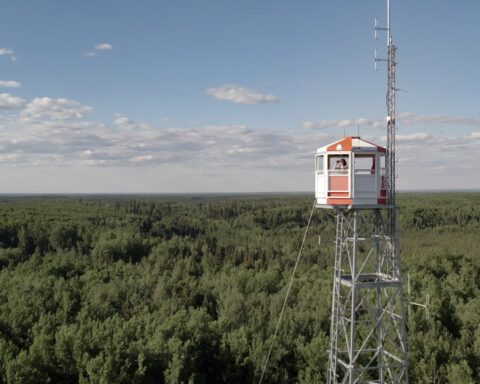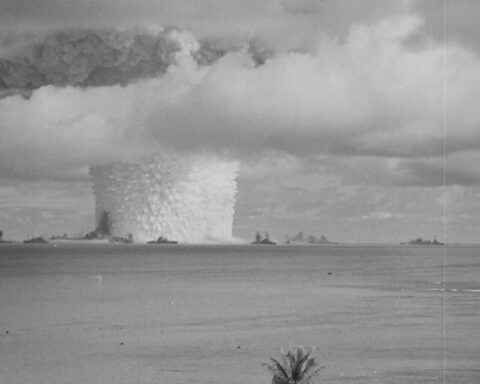Every festival organizer has something to worry about and island festivals have their own unique challenges. For Petra Holzer, festival director of BIFED (Bozcaada International Festival of Ecological Documentary), a stormy sea, ferry cancellations, electrical outages and a last minute venue change were her worries in the days leading up to the second edition of this daring new festival. While these issues were daunting, they came on the heels of even stormier social concerns—bombings that left over 100 dead just days before the festival started, a new wave of censorship at Turkish film festivals, an ongoing refugee crisis, and heated elections in the week following the festival. For all of these reasons, the second edition of BIFED had an aura of urgency.
I attended the festival as a juror, along with filmmakers and journalists from Turkey, Greece, and Syria. I was eager to experience this new festival and to understand how regional filmmakers were coping with the area’s increasingly tense politics. The festival takes place in Bozcaada, located in the Aegean Sea, just north of neighboring Lesbos and Limnos. The island with 2000 year round residents is one of Turkey’s busiest tourist destinations, welcoming up to 40,000 visitors during the summer season. Wild thyme and grapes grow abundantly and with six major wineries, locals boast of 5000 years of wine-making experience. Historically, this is where the Greeks hid after planting their Trojan horse in nearby Troy.
Getting to Bozcaada is part of the adventure. After a long flight from Montreal, I took an overnight bus from Istanbul, followed by a short ferry ride to Bozcaada, where Petra Holzer, the festival director, was waiting at the dock to greet me. I first met Petra in 2007, at an island festival, in Rhodos, Greece. I was premiering my film The Water Front and Petra and her husband, Ethem Özgüven were screening Alethea, a film they had worked on for ten years, about a struggle against a Canadian gold mine in the region of Bergama in Turkey. Ethem is a professor of documentary production at Bilgi University in Istanbul. An avid conversationalist with a philosophical bent and a playful wit, Ethem was busy directing a tiny army of projectionists, students and local volunteers when I arrived. Petra is a visual artist and curator from Austria who moved to Turkey when she married Ethem twenty years ago. She is well-respected for her ability to confront challenges with efficiency, grace and a sensitivity for island culture. Petra and Ethem spent their honeymoon on Bozcaada and they now own a cottage there with a small olive orchard.
The island has a tradition of welcoming artists and intellectuals like Petra and Ethem. The festival’s grand prize is named after Fethi Kayaalp, one of Turkey’s most influential print artist who was born and raised in Bozcaada and is still active at 92. Ethem explained to me how in the early 70’s Fethi Kayaalp encouraged other architects, painters, sculptors and academics to join him on what was then a relatively unknown island. According to Ethem, Kayaalp invited a group of friends to the island. After several nights of drinking wine, eating fish and envisioning a shared future, many of these artists bought small plots on the island and have supported Kayaalp in his vision to create an environment where nature would inspire art and artists would play a role in protecting the island. As a result of their efforts, Bozcaada has not developed at the same frantic pace as some of the Greek islands or even Turkey’s mainland coastal villages.
Bozcaada is an ideal venue for an ecological film festival given that the island runs entirely on green energy. With seventeen wind turbines, the island hosts the third largest wind power station in Turkey. Generating 30 times more electricity than they need, the island then sends excess electricity under the sea to the mainland. The owner of the power station, Önder Demirer is a supporter of the festival. He is not alone. Many businesses and residents contribute to BIFED. I stayed in a lovely cottage overlooking the sea, generously donated to the festival by the owners. Another family prepared breakfast each morning for all of the jury members; turkish coffee, fresh eggs, feta cheese, olives and a variety of homemade marmalades. We ate lunches and dinners either at the community centre, which was the festival hub, or at local restaurants where we were treated to fresh seafood and abundant local red wine.
The idea for the festival arose while Ethem and the newly elected mayor, Hakan Can Yılmaz, were working on a campaign to protect the vineyards from major urbanization plans. Hakan Can Yılmaz, the island doctor for ten years before being elected mayor, is a progressive candidate of Turkey’s social democratic party, and he and Ethem envisioned the festival as part of a larger effort to protect the island from over-zealous development schemes and to help islanders consider the impacts of a growing tourist industry. Strong community and municipal government support has meant that the festival is able to offer all screenings free of charge. This is not only a way of ensuring community participation and packed theatres, but it is also a calculated strategy to avoid government censorship. If festival organizers don’t charge admission, the government has less power to meddle in their affairs. In a passionate speech to launch the festival, the mayor, who is also the president of the festival, proudly announced how this was one of the few festivals in Turkey that had complete autonomy in their programming choices. His speech was in part directed to the conservative government official who had been sent to observe the festival.
The last years have been especially challenging for documentary makers in Turkey. In October 2014, officials attempted to censor a selection committee’s decision to screen a film about the Gezi Park protests of 2013, Love Will Change the Earth by Reyan Tuvi, in the Antalya International Film Festival. In response, directors of 11 of the 15 documentaries scheduled to be in the festival withdrew their films along with the entire documentary jury. In April, at the Istanbul Film Festival, government censorship resulted in 23 Turkish filmmakers withdrawing their films and the cancellation of all competitions. The controversy began with the film Bakur (North, Çayan Demirel and Ertugrul Mavioglu, 2015), the first documentary to gain access to Kurdish guerrilla camps in southern Turkey. The film was pulled only hours before the scheduled screening because the Turkish Ministry of Culture sent a letter to the festival organizers claiming that the film did not have a required exhibition certificate (a requirement that was introduced in 2004 but that has not been consistently enforced). Many documentary filmmakers refuse to apply for the certificate on principle, stating their objection to this mechanism of control.
Bakur was shot during a ceasefire in 2013, between the Kurdistan Workers Party (PKK) and the Turkish government and is a sympathetic perspective of the guerrillas who have been at war with the Turkish military for three decades. As is often true in situations of censorship, the strategy to suppress the film backfired and the documentary has since received a great deal of international coverage.
Another setback for the documentary community was the announcement in early October that the 1001 Documentary Festival would postpone their festival, issuing a statement, that, in part, said:
We are witnessing the loss of life, curfews and organized mass violence. Terror seems to have taken over. The toxic environment formed by the upcoming election is adding to the unknowns. Our festival has more obstacles to overcome than ever before.
The concerns of the festival organizers were well founded. Ten days before my arrival in Turkey, two suicide bombers killed over 100 people attending a peace rally in central Ankara. Journalists claimed it was the deadliest terror attack in Turkish modern history. While the attack went unclaimed, many felt that cultivating an environment of fear was in the interest of President Recep Tayyip Erdogan of the conservative Justice and Development Party (AKP). June elections had resulted in a divided parliament and a collapse of ceasefire negotiations between the government and the PKK. Erdoğan called a second round of elections for November and many were concerned about the growing authoritarianism of his government and doubtful about his motivations and the possibility of a fair election. He had been accused of censorship and electoral fraud, among other constitutional violations.
The country’s recent traumas, and the stormy weather, were present throughout the festival, but did not overshadow the excellent programming, the tremendous solidarity and the overall celebration of a cutting edge festival. 64 films were screened over three days to theaters packed with enthusiastic local and international audiences. There was a strong representation of Canadian films including Su Rynard’s The Messenger, which was in official competition along with 16 other documentaries.
The final night of the festival was particularly emotional when our jury began the awards ceremony with a tribute to those who were murdered in the recent bombings:
Voice is the essence of any film. It also the essence of art and ultimately of democracy. We would like to acknowledge the tragedy of the lost voices of the 118 people who were murdered on October 10th, 2015. They were exercising their right to speak out, to ensure their future, our collective future. As a jury we would like to acknowledge their courage.
We went on to grant the first place, Fethi Kayaalp award to a quiet but superbly constructed Chilean documentary, Surire, named after a salt flat located in the Chile’s high plateau. The filmmakers, Bettina Perut and Iván Osnovikoff, foreground a handful of elders, the last survivors of the Aymara culture who inhabit the region with flamingos, lamas, and vicunas. In the background, they capture the constant flow of mining machinery forcing us as viewers to contemplate this haunting depiction of slow violence and incompatible futures. The jury awarded the second prize to I am the People, a film shot by first time filmmaker, Anna Roussillon, over a three-year period in Luxor, Egypt. From the overthrow of Mubarak to the fall of Morsi, Anna documents a rapidly changing political landscape through exchanges with the main protagonist Farraj, a hard working and charismatic farmer. We awarded the third prize to Paolo Pisanelli, director of Good Morning Taranto, who documents the lives of activist citizens in a city poisoned by the largest steel plant in Italy, still running on coal. The theme was particularly relevant to a region where struggles over pollution versus prosperity run deep.
My short visit to the stunning island of Bozcaada was a confirmation of the vital role that a documentary festival plays in a small community and just how important documentary festivals are in times of turmoil and transition. Petra Holzer explained that one of her biggest challenges for the future is to ensure funding so that the festival can continue to attract international visitors. Finding sponsors for cultural events in Turkey, and elsewhere, is always a challenge, but for festivals programming sensitive political issues, trying to secure funding is magnified.
Please visit www.bifed.org/en/ for more information.










